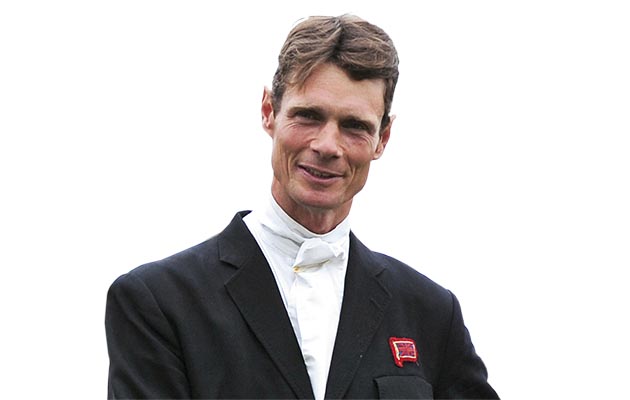William has won 20 Olympic, world and European senior championships medals, including six European team golds and five individual medals. He triumphed at all the world’s five northern hemisphere five-stars with 14 wins at the level in total – more than any other rider – including two at Badminton and a record six at Burghley. A serious fall in 2015 left him in a coma for two weeks, but he came back to make the British team for Rio 2016.
We had Ballincoola as an eight-year-old and he was a real jumping machine. He was such a performer and a horse of a lifetime. I never got to grips with his flatwork, so his dressage was never team-worthy, but I know much more now and if I had him in my old age I know it could have been better.
He won Burghley in 2005 and was third at Badminton in 2008. He was absolutely made for the fast and furious modern version of the sport as it is now; the skinnies and arrowheads would have suited him down to the ground.
{"content":"PHA+SeKAmW0gYSBwZXJzb24gdGhhdCBnZW5lcmFsbHkgcnVucyBsYXRlIGFuZCBhbHdheXMgdGhpbmtzIG9mIHNvbWV0aGluZyBlbHNlIHRoYXQgbmVlZHMgdG8gYmUgZG9uZSBhdCB0aGUgbGFzdCBtaW51dGUuIE9uIGNvbXBldGl0aW9uIGRheSwgSSB0cnkgbmV2ZXIgdG8gYmUgaW4gYSBodXJyeS4gQWxsb3cgZm9yIGRlbGF5cywgZXhwZWN0IHRoZSB1bmV4cGVjdGVkIGFuZCByZW1lbWJlciB3aGVuIHlvdeKAmXJlIGdvaW5nIHRvIGFuIGV2ZW50IGV2ZXJ5dGhpbmcgdGFrZXMgdGhhdCBsaXR0bGUgYml0IGxvbmdlci48L3A+CjxwPkV2ZXJ5IHJpZGVyIGhhcyB0aG9zZSBhbWF6aW5nIGRheXMsIHRob3NlIGJhZCBkYXlzIGFuZCB0aG9zZSBkYXlzIHdoZW4gdGhleSByaWRlIGxpa2UgYSByYWJiaXQ7IGV2ZW4gTWljaGFlbCBKdW5nIG1ha2VzIG1pc3Rha2VzLiBZb3UgY2FuIGJlIHByZXBhcmVkLCBkbyBhbGwgeW91ciBob21ld29yaywgYnV0IHlvdeKAmXJlIG5ldmVyIGd1YXJhbnRlZWQgYSByZXN1bHQ7IHlvdSBoYXZlIHRvIGhvcGUgZm9yIHRoZSBiZXN0LCBidXQgYmUgcHJlcGFyZWQgZm9yIHRoZSB3b3JzdC4gVGhlcmUgaGF2ZSBiZWVuIHBsZW50eSBvZiB0aW1lcyB0aHJvdWdob3V0IG15IGNhcmVlciB3aGVuIGl04oCZcyBub3QgY29tZSBvZmYsIGJ1dCB0aGVyZSB3aWxsIGJlIGRheXMgd2hlbiB0aGUgd2luZCBpcyBpbiB5b3VyIHNhaWwuPC9wPgo8cD5NeSByaWRpbmcgaWNvbiBpcyBMdWNpbmRhIEdyZWVuLiBEdXJpbmcgaGVyIHRpbWUsIHNoZSB3YXMgdG9wIG9mIHRoZSBnYW1lIGFuZCBubyBvbmUgY291bGQgbWF0Y2ggaGVyLiBTaGXigJlzIGFsd2F5cyBiZWVuLCBhbmQgc3RpbGwgaXMsIHNvIGdlbmVyb3VzIGluIHNoYXJpbmcgaGVyIGtub3dsZWRnZSBhbmQgZXhwZXJ0aXNlIHdpdGggcGVvcGxlIHdobyBkb27igJl0IGhhdmUgdGhhdCB3ZWFsdGggb2YgZXhwZXJpZW5jZS4gU2hl4oCZcyBuZXZlciBzdG9wcGVkIGJlaW5nIGEgcmVhbCBob3JzZXdvbWFuIGFuZCB0aGUgc3BvcnQgaXMgaW4gZGFuZ2VyIG9mIGxvc2luZyB0aGF0IGJlY2F1c2UgaXTigJlzIGJlY29tZSBtb3JlIGFib3V0IHZpY3RvcmllcyBhbmQgd29ybGQgcmFua2luZ3MuPC9wPgo8cD48ZGl2IGNsYXNzPSJhZC1jb250YWluZXIgYWQtY29udGFpbmVyLS1tb2JpbGUiPjxkaXYgaWQ9InBvc3QtaW5saW5lLTIiIGNsYXNzPSJpcGMtYWR2ZXJ0Ij48L2Rpdj48L2Rpdj48c2VjdGlvbiBpZD0iZW1iZWRfY29kZS0zMSIgY2xhc3M9ImhpZGRlbi1tZCBoaWRkZW4tbGcgcy1jb250YWluZXIgc3RpY2t5LWFuY2hvciBoaWRlLXdpZGdldC10aXRsZSB3aWRnZXRfZW1iZWRfY29kZSBwcmVtaXVtX2lubGluZV8yIj48c2VjdGlvbiBjbGFzcz0icy1jb250YWluZXIgbGlzdGluZy0tc2luZ2xlIGxpc3RpbmctLXNpbmdsZS1zaGFyZXRocm91Z2ggaW1hZ2UtYXNwZWN0LWxhbmRzY2FwZSBkZWZhdWx0IHNoYXJldGhyb3VnaC1hZCBzaGFyZXRocm91Z2gtYWQtaGlkZGVuIj4NCiAgPGRpdiBjbGFzcz0icy1jb250YWluZXJfX2lubmVyIj4NCiAgICA8dWw+DQogICAgICA8bGkgaWQ9Im5hdGl2ZS1jb250ZW50LW1vYmlsZSIgY2xhc3M9Imxpc3RpbmctaXRlbSI+DQogICAgICA8L2xpPg0KICAgIDwvdWw+DQogIDwvZGl2Pg0KPC9zZWN0aW9uPjwvc2VjdGlvbj48L3A+CjxoMz5PaCB0byBoYXZlIGtub3duPC9oMz4KPHA+QSBzdHJvbmcgbGVzc29uIEkgbGVhcm50IGVhcmx5IG9uIHdhcyB0aGF0IHNob3dqdW1waW5nIGZlbmNlcyBkaWRu4oCZdCBuZWVkIHRoZSBzYW1lIHNwZWVkIGFzIGNyb3NzLWNvdW50cnkganVtcHMuIEkgZGlkbuKAmXQgcmVhbGx5IHRoaW5rIGFib3V0IGl0IGF0IHRoZSB0aW1lIGFzIEkganVzdCBsaWtlZCBqdW1waW5nIGp1bXBzLiBJIGRpZG7igJl0IHRha2UgaW50byBhY2NvdW50IHRoZSBkaWZmZXJlbnQgdmFyaWF0aW9ucyBvZiBqdW1waW5nIGFuZCBob3cgdG8gYXR0YWNrIHRoZW0uPC9wPgo8cD5NeSBtb3RoZXIgTWFyaWV0dGEgY29tcGV0ZWQgYXQgdG9wIGxldmVsIGFuZCBzaGUgYWx3YXlzIG1hZGUgaXQgY2xlYXIgdGhhdCBhcyBodW1hbiBiZWluZ3Mgd2UgaGF2ZSB0aGUgYWJpbGl0eSB0byBjb250cm9sIG91ciBuZXJ2ZXMuIFdoZW4gSSB3YXMgeW91bmdlciBJIHVzZWQgdG8gcmlkZSBmcm9tIHNjaG9vbCwgc28gSSB3YXMgcGlja2VkIHVwIHRvIGdvIHRvIGFuIGV2ZW50IGFuZCBpdCBiZWNhbWUgcXVpdGUgYSBiaWcgdGhpbmcuIEkgd2FzIGF3YXJlIHRoYXQgYSBsb3Qgb2YgZWZmb3J0IGhhZCBnb25lIGludG8gaXQgYW5kIEkgaGFkIHRoaXMgdGVycmlmeWluZyBmZWFyIG9mIGxldHRpbmcgZXZlcnlvbmUgZG93bi4gSW4gdGhlIGVuZCBJIHJlYWxpc2VkIHRoYXQgZXZlcnlvbmUgaXMgZmVlbGluZyB0aGUgc2FtZSBhbmQgeW91IGp1c3QgaGF2ZSB0byBnZXQgb24gYW5kIGRlYWwgd2l0aCBpdC48L3A+CjxwPkkgZmVlZCBteSBob3JzZXMgbGl0dGxlIGFuZCBvZnRlbi4gTW9zdCBwZW9wbGUgZmVlZCB0aGVpciBob3JzZXMgdG9vIG11Y2guIEhvcnNlcyBhcmUgZGVzaWduZWQgdG8gbGl2ZSBvbiBncmFzcyBhbmQgeW91IG5lZWQgdG8gYmUgYnJhdmUgZW5vdWdoIG5vdCB0byBvdmVyIGZlZWQsIGFuZCBsZXQgdGhlbSBiZSB0aGUgZ3JhemVycyB0aGV54oCZcmUgbWVhbnQgdG8gYmUuIEkgbGlrZSBteSBob3JzZXMgdG8gYmUgb3V0IGFsbCB0aGUgdGltZSB3aGVuIHRoZXnigJlyZSBub3QgYmVpbmcgcmlkZGVuIGFzIHRoZXnigJlyZSBtYWRlIHRvIHJvYW0uPC9wPgo8ZGl2IGNsYXNzPSJhZC1jb250YWluZXIgYWQtY29udGFpbmVyLS1tb2JpbGUiPjxkaXYgaWQ9InBvc3QtaW5saW5lLTMiIGNsYXNzPSJpcGMtYWR2ZXJ0Ij48L2Rpdj48L2Rpdj4KPHA+SSBkbyBsb3RzIG9mIGxvbmcsIGxvdyBhbmQgc29mdCB3b3JrIGluIHRoZSB3YXJtLXVwLiBUb28gbWFueSByaWRlcnMgYXJlIGluIGEgaHVycnksIGdldCBvbiBhbmQgZXhwZWN0IHRoZWlyIGhvcnNlIHRvIGJlIHJlYWR5IHRvIGdvLiBJIGFsc28gdHJ5IHRvIGJlIHBhdGllbnQuPC9wPgo8ZGl2IGNsYXNzPSJpbmplY3Rpb24iPjwvZGl2Pgo8cD5XaGVuIEkgd2FzIHlvdW5nIEkgd2FudGVkIHRvIGFjaGlldmUgYmlnIHRoaW5ncyBmYXN0LiBJIHdhcyBlbmVyZ2lzZWQgYW5kIEkganVzdCB3YW50ZWQgdG8ganVtcCBmZW5jZXMgYW5kIHdpbiDigJMgbm93IEkgcmVhbGlzZSB5b3UgY2Fu4oCZdCB0YWtlIGl0IGFsbCB0b28gcXVpY2tseSBhbmQgd2hlbiB0aGUgZGF5IGlzIHJpZ2h0IGl0IHdpbGwgYWxsIGZhbGwgaW50byBwbGFjZS48L3A+CjxkaXYgY2xhc3M9ImFkLWNvbnRhaW5lciBhZC1jb250YWluZXItLW1vYmlsZSI+PGRpdiBpZD0icG9zdC1pbmxpbmUtNCIgY2xhc3M9ImlwYy1hZHZlcnQiPjwvZGl2PjwvZGl2Pgo8cD5Bbm90aGVyIG9uZSBvZiBteSBtb3RoZXLigJlzIG1vdHRvcyB3YXMsIOKAnElmIHlvdeKAmXJlIGZlZWxpbmcgY3Jvc3MsIGdldCBvZmYu4oCdIEtlZXAgdGhlIGJpZ2dlciBwaWN0dXJlIGluIG1pbmQsIGRvbuKAmXQgYXNrIGZvciB0b28gbXVjaCB0b28gc29vbiBhbmQgeW91ciBwYXRpZW5jZSB3aWxsIHBheSBvZmYuPC9wPgo8cD48ZW0+UmVmIEhvcnNlICZhbXA7IEhvdW5kOyAyOCBNYXkgMjAyMDwvZW0+PC9wPgo8ZGl2IGNsYXNzPSJhZC1jb250YWluZXIgYWQtY29udGFpbmVyLS1tb2JpbGUiPjxkaXYgaWQ9InBvc3QtaW5saW5lLTUiIGNsYXNzPSJpcGMtYWR2ZXJ0Ij48L2Rpdj48L2Rpdj4KPHA+Cg=="}
You may also be interested in…
William Fox-Pitt obviously needs no introduction, but there are perhaps a few things you might not know about him. To
William Fox-Pitt and Chilli in the dressage at the Rio Olympics. Picture by Peter Nixon
The British rider's participation in Rio is little short of a miracle: 'I'm very lucky and happy to be here'
William Fox-Pitt and Chilli Morning at Bramham 2016. Picture by Peter Nixon
The Team GB eventer reflects on his comeback from a serious fall last autumn to be selected for Rio
William Fox-Pitt showed he can still be competitive with his first victories since his comeback, at Tattersalls in Ireland
Credit: Peter Nixon
The Olympic silver medal-winning eventer rode Parklane Hawk and Cool Mountain in the open intermediate at Burnham Market
Credit: Trevor Meeks
The Olympic eventer has been discharged from hospital
Credit: Trevor Meeks
The top British event rider fell while taking part in the world championships for young event horses in France







